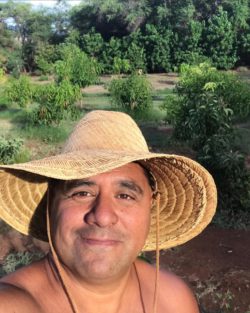Farming Keeps Social Worker Grounded
By Paul Hanley, Community Reporter

Photo by Brent Nakihei.
Brent Nakihei has been working on the ‘aina since he was a child. The youngest of 12, he used to do chores for his grandparents Albert and Agnes Ne on their piggery farm in Kalama’ula. Now 53, he has started farming again on the same land, originally leased by his great grandfather John Pua’a in 1923, the fifth Hawaiian Homestead on the Hawaiian Islands.
Molokai farmers like Kekama Helm inspired Nakihei to get back into farming and to do it sustainably. His initial venture is a 1.6-acre field planted into avocado, soursop, white guava, lichee, ulu, and different types of mangoes — about 50 trees in all. Nakihei, who works for the State as a juvenile probation officer, started this project in 2018, but he is not quitting his day job any time soon.
“This approach takes time. It will be two more years before I have enough fruit to sell, but the goal is to have a commercial organic orchard.” In the meantime, “Farming keeps me grounded,” he says.
It has not always been a smooth ride through life for Nakihei. He speaks openly about his past issues with drug addiction and the law.
“It started when my grandfather died when I was in eighth grade. In my sophomore year of high school, I was caught using drugs and alcohol and expelled,” he says. “The arresting officer happened to be a football coach at Lahainaluna High School. Since I was good at sports, I was given a choice: go to juvenile hall on Oahu or go to Maui to continue school and play football. It wasn’t hard to choose.
“I loved it at Lahainluna. In addition to sports, they had a good agriculture program for boarders. We worked on the school farm for room and board. I learned about gardening, poultry and livestock. The food we produced supplied the school cafeteria.”
Unfortunately, that wasn’t all he learned. He was exposed to more drugs and alcohol at school and more so when he got a job as a bartender at the Old Lahaina Luʻau after graduation.
In 1992 he returned to Molokai and got a job at Holden Foundation Seeds. On the side, he was selling drugs. In 2003 he was arrested and sentenced to five years in prison.
“I was still on drugs. I took the Molokai ferry over to Maui to appear at prison. In one hand I had a pipe and in the other a bible. As I went into prison, I threw the pipe in the trash and held on to the bible,” Nakihei says.
Paroled after nine months, he credits his deep involvement in King’s Chapel for keeping him on the straight and narrow. This April, he will be 20 years clean and sober.
Back on Molokai, he was given an opportunity to become a substance abuse counsellor. He went back to college in 2006. Later, in 2016, he earned a master’s degree in social work and now works for Family Court.
“But somehow I always trickle back to farming,” says Nakihei. “It’s my long-term goal.”
Nakihei took advantage of grants available from the USDA and other agencies to get started.
The program helped him clear the kiawe trees and fence the property.
“One stipulation is that I had to grow native plants on the edges of the land, to prevent erosion. I planted Milo, Kou, and Ma’o. Bayer provided their heavy disc to do the initial cultivation,” he explains.
Nakihei plans to expand beyond the orchard and grow taro, beans, and other vegetables in future. “And I still have the pig pens built by my grandfather 30 to 40 years ago,” he says.
Efforts by small farmers like Brent Nakihei and his wife Amber are building Molokai’s capacity to achieve food sovereignty.











Don't have a Molokai Dispatch ID?
Sign up is easy. Sign up now
You must login to post a comment.
Lost Password